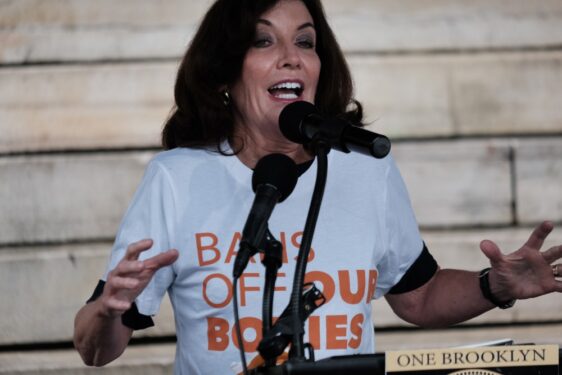
PROSPECT HEIGHTS — While expressing disappointment that a New York State Court of Appeals has upheld a state mandate that requires employers to cover abortion in their employee health insurance plans, the New York State Catholic Conference is confident an appeal to the Supreme Court will be successful.
In the case, Diocese of Albany v. Vullo, New York State Court of Appeals Chief Judge Rowan Wilson ruled on Tuesday, May 21, that both the regulation itself and the criteria to qualify for a religious exemption “are generally applicable and do not violate the Free Exercise Clause” of the First Amendment.
Dennis Poust, the executive director of the NYSCC, said the decision is wrong.
“We are disappointed in this ruling and believe it is wrongly decided,” Poust said in a May 21 statement. “We continue to believe that the regulatory action by the state, as well as subsequent legislative action, requiring religious organizations to provide and pay for coverage of abortion in its employee health plans, is unconstitutional and unjust.”
Poust said the expectation is that the decision will now be appealed to the Supreme Court.
Gov. Kathy Hochul of New York said in a May 21 statement that the New York State Court of Appeals May 21 decision is “a critical step towards protecting” abortion rights as “right-wing extremists attempt to undermine our fundamental freedoms.”
“While right-wing extremists attempt to undermine our fundamental freedoms, New York will continue standing strong to protect women’s health care and safeguard abortion rights,” Hochul said. “The Court of Appeals’ unanimous ruling to uphold New York’s nation-leading regulations for insurance coverage of abortion care is a critical step towards protecting these fundamental freedoms.”
Hochul added that she is committed to ensuring New York is a safe harbor for abortion access.
Later in the day, Poust denounced Hochul’s comments, and her use of the phrase right-wing extremists. He noted that the plaintiffs in the case include the Catholic Dioceses of Albany and Ogdensburg, Catholic Charities of the Dioceses of Brooklyn, Albany, and Ogdensburg, and other churches and faith-based organizations from across the state.
“Following today’s Court of Appeals decision upholding an abortion insurance mandate on Catholic and other religious employers, Governor Kathy Hochul could have simply put out a statement supporting the court’s ruling,” Poust said. “Instead, she delved into name calling, referring to the plaintiffs in the case as ‘right-wing’ extremists.’”
“To be clear, this case had nothing to do with the legality of abortion; it only involved the question of whether the state could force religious employers to violate the tenets of their faith by mandating coverage for abortion in employee health insurance plans,” Poust added.
Hochul’s statement comes about a week after she met with Pope Francis while in Rome for a conference. A spokesperson for Hochul later clarified to The Tablet that Hochul’s use of right-wing extremists “refers to political leaders who have extreme positions on reproductive rights.”
The case at hand dates back to 2017, when the New York State Department of Financial Services implemented the mandate that employers must cover abortions in their employee health insurance plans. As originally written, the mandate includes only a narrow exemption covering religious groups that both primarily teach religion and primarily serve and hire those who share the faith.
However, many religious ministries don’t qualify for that exemption because they serve all people regardless of their beliefs or religious affiliations. The narrowness of the exemption prompted the Diocese of Albany and other related entities to sue.
The religious groups’ first attempt to have the mandate overturned in the courts failed, as the New York State courts sided with the state. The groups then appealed to the Supreme Court, which in 2021 reversed the lower courts’ rulings and told them to reconsider the case.
Now that the second state ruling has come down, the groups’ only course of action is to appeal again to the Supreme Court. Poust said he expects this will happen and, given the Supreme Court’s earlier ruling in the case, that it will be successful.
“The Supreme Court already has vacated this New York court decision once, remanding it to be reconsidered,” Poust said. “We are confident the Court will grant a writ of certiorari again now that the New York courts have disregarded recent Supreme Court religious liberty precedent.”
Adrienne Harris, the Superintendent of the New York Department of Financial Services, said in a May 21st statement that the New York State Court of Appeals decision “rightfully upholds DFS’s regulatory authority, further cementing New York’s leadership in protecting women’s healthcare choices.”
“DFS’s actions have ensured that women in New York have control over their reproductive choices and that insurers cover abortions and contraceptives with no copayments, deductibles, or any out-of-pocket costs,” Harris said. “I will continue to work every day to advance policies that create a more equitable financial system for all New Yorkers.”
In April, a group of New York Catholic dioceses and Catholic nuns argued before the New York State Court of Appeals that the mandate went against their religious beliefs and violated the First Amendment.
At the time, Noel Francisco, partner-in-charge of Jones Day’s Washington Office, who argued on behalf of the religious groups in court, said in a statement that the court should follow the guidance of the Supreme Court and protect religious freedom.
“Religious groups in New York should not be required to provide insurance coverage that violates their deeply held religious beliefs,” Francisco said.
“We asked the court to follow the U.S. Supreme Court’s guidance, protect religious freedom, and make clear that the mandate cannot be applied to this diverse group of religious organizations.”
